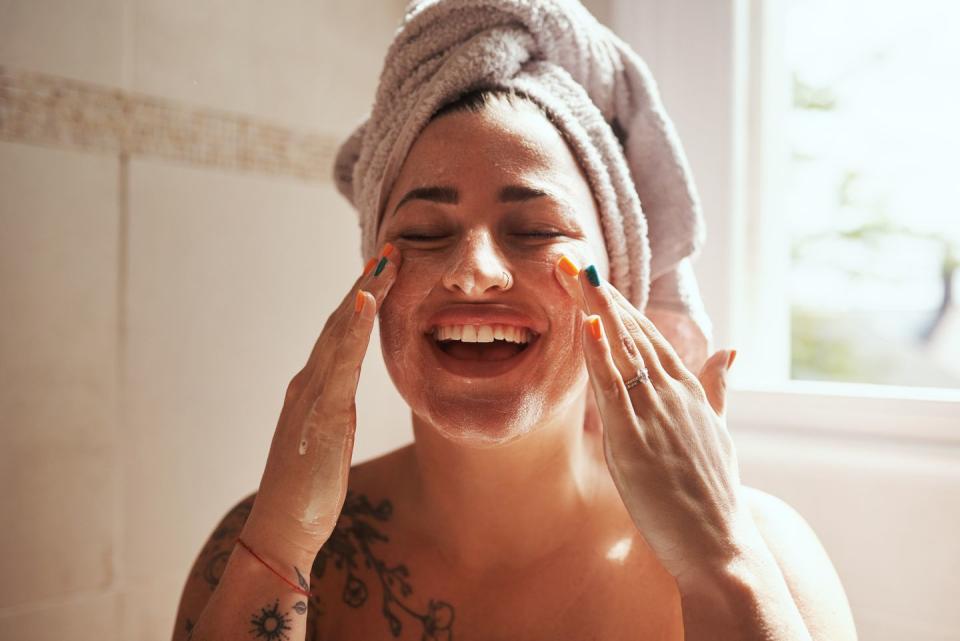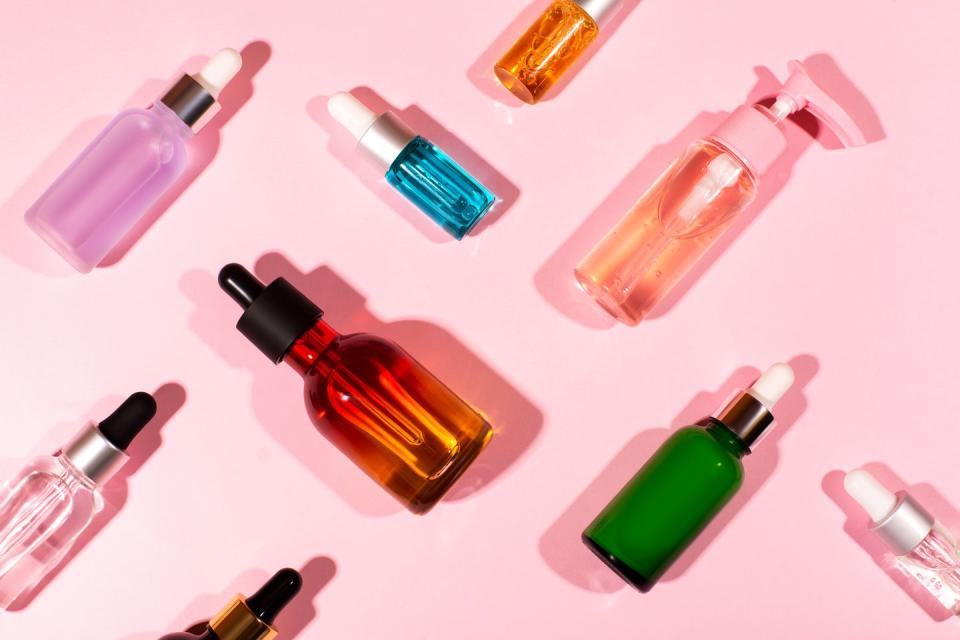32 tips to get clear skin, according to a dermatologist

Many of us expose the delicate skin on our face to punishing treatments, harsh products and lengthy multiple-step regimens in the quest for a radiant, blemish-free complexion. If you're curious about how to get clear skin, the solution is clearer-cut than you might think.
Whether you're struggling with frequent breakouts or just want to know how to take better care of your face, we spoke to Dr Adam Friedmann, consultant dermatologist at Stratum Dermatology Clinics, for 32 expert-backed tips on how to get clear skin – and keep it that way:
1) Use a mild cleanser
How to get clear skin 101: pick the right cleanser. 'If your skin is fairly spot-free, opt for a simple light cream for cleansing, such as aqueous cream or Dermol,' says Dr Friedmann. To tackle whitehead outbreaks, acid-based face washes are useful, he adds. 'Benzoyl peroxide is a good ingredient to look for. A plus-point with benzoyl peroxide products is that bacteria does not develop a resistance to it, as can be the case with antibiotics.'
2) Wash your face twice a day
Tempting as it may be after a long day, don't skip washing your face at morning and night time to keep breakouts at bay. Equally, don't over-wash the face either. 'It is important not to over-wash the face, as soaps and harsh cleansers can irritate the skin and do more harm than good by causing drying, redness and flaking,' says Dr Friedmann.
3) Make sure you moisturise
If your skin becomes very dry, there's a chance it could over-compensate by producing too much oil, which may lead to breakouts. 'Moisturisers add a waterproof coating onto the skin, thereby reducing evaporative loss of water from the skin,' says Dr Friedmann. 'If moisturisers are too thin, they will evaporate very quickly and leave skin dryer. So, the thicker the cream, the better it hydrates.'
4) Exfoliate carefully
When we're learning how to get clear skin, one of the first things we're told is that exfoliation is crucial. It clears dead skin cells, which can clog pores and cause breakouts. While that's true, the type of exfoliant you use matters. It's best to choose enzyme or acid-based products, since harsh exfoliators can cause micro-tears in the skin, making it vulnerable to bacteria. 'Active ingredients such as AHA will encourage cell turnover by stimulating the cell renewal of the epidermis,' says Dr Friedmann. 'BHAs exfoliate from the outside in, penetrating deep into pores to clear out sebum and any p-acne bacteria.'
5) Don't pick your skin
All you're doing is exposing the area to more bacteria, which will make the situation worse. 'While it might be tempting to pick spots, it's best not to cause any physical damage to the skin as you will run the risk of scarring and secondary bacterial infections,' says Dr Friedmann. So, leave that zit alone.
6) Choose noncomedogenic makeup
Noncomedogenic means the make-up has been specially-formulated to keep your pores clear. It'll contain ingredients that are highly unlikely to cause the blockages – also known as comedones – that lead to breakouts. 'Beauty products are one of the most common causes of blemished skin and worsening adult acne,' says Dr Friedmann. 'Moisturisers, sunscreen and especially makeup that may be too thick and oily may clog pores, resulting in spots. Switch to oil-free alternatives.'
7) Sleep more
Getting a restorative night's kip is crucial for clear skin – there's a relationship between acne severity and sleep quality in adults, research has shown. Getting plenty of sleep will have a positive effect on your immune system, Dr Friedmann says. 'A healthy immune system minimises the risk of acne flare-up, something that can occur when people are feeling run down and exhausted,' he explains.
8) Stress less
Stress is a known factor in the development of breakouts – in fact, several studies have linked the two. 'Stress can cause hormones to fluctuate and increase oil production, leading to a flare up – so anything you can do to incorporate some calm into your day will help,' says Dr Friedmann. FYI: sleep deprivation significantly raises levels of the stress hormone cortisol, too.

9) Avoid sugar and refined carbs
Foods with a high glycemic index – for example, crisps, cakes, cookies and fries – may be linked with acne. When more than 2,000 people were put on a low-glycemic diet, 87 per cent found they had less acne by the end of the study, and 91 pe cent needed less acne medication.
10) Quit smoking
There are a million and one reasons to stub out the cigs, and a clear complexion is one of them. An increasing body of research has shown that smoking can not just worsen but even cause acne. Lighting up on the regular increases sebum peroxidation and reduces vitamin E production, a study found – two key triggers that contribute to the onset of acne. The same research found that smokers were four times as likely to have acne than non-smokers.
11) Clean your phone
Your phone contains 10 times more bacteria than most toilet seats, research from the University of Arizona discovered. Every time you take a call – or touch your face after sending a text – you're exposing your face to a huge variety of germs, so make sure you wipe your phone with an antibacterial wipe frequently.
12) Simplify your routine
Dial that 12-step skincare regimen back a notch. 'It is important not to subject the skin to too many products because the skin will not know which message to follow,' says Dr Friedmann. 'Stick to a basic skin routine which should include cleansing/exfoliation [and] a day-time moisturiser with SPF and antioxidant protection to calm and defend the skin.'
14) Don't skip sunscreen
'It is important to apply it after your moisturiser every day on areas exposed to the sun from March to September,' says Dr Friedmann. 'Use one with five stars of "UVA" protection to give the highest levels of defence.' In the evening, choose a night-time moisturiser that'll help correct your specific skincare concerns. 'Look for moisturisers with retinols for addressing collagen remodelling and hyperpigmentation, as well as treating active acne by shrinking the sebaceous glands and regulating sebum,' he adds.
13) Wash your hands
It seems obvious, but you should always wash your hands before applying makeup or skincare products. Your hands are covered in bacteria all the time, collected from touching keyboards, door handles, pets, the TV remote, etcetera, so clean up before you start applying products. Similarly, be sure to wash makeup brushes and sponges on a weekly basis – they harbour bacteria and oil that can cause your skin to become inflamed.
14) Rinse your face with cold water
While it's always best to cleanse with warm (not hot!) water, finishing your routine with a splash of the cold stuff will promote a clearer complexion. Cold water promotes blood circulation, tightening your pores and enhancing the brightness for a natural (free) glow.
15) Use a separate face towel
If you can't seem to quit breaking out, your choice of towel could be to blame. Not only will your bath towel transfer oils from your body or your hair to your face, but it also harbours bacteria, so keep a separate towel for drying your face post-cleanse. Replace it with a fresh one at least every couple of days – every day if you can – and pat your skin dry, don't scrub.

16) Ice your pimples
Instead of attempting to rupture prospective zits, ice them. Dealing with angry pimples in this way will decrease swelling; reducing the size of the spot and alleviating any redness. Just be sure to wash your face and hands first. This trick won't work on blackheads or whiteheads – just inflammatory spots such as pustules, papules, nodules and cysts.
17) Use a cleansing brush
To make the cleansing process more effective, use an electric cleansing device. It penetrates deep into your pores, removing excess oil and dirt from your skin, and has a mild exfoliating effect too. It's a simple way to make your skincare products more effective to achieve a fresher, brighter-looking complexion.
18) Massage your face
Facial massage is relaxing and rejuvenating in equal measure, tackling puffiness and increasing firmness. By massaging your face on the regs, you'll boost blood flow and encourage lymphatic drainage that flushes out waste and toxins. Plus, you'll stimulate collagen production and cell growth and activate your skincare products to make them more effective.
19) Use a clay mask
A must for anyone looking to enhance their complexion – but particular those with oily, combination, and acne-prone skin – clay masks draw out impurities from deep within the skin, absorb excess oil, and clear the pores. Once or twice per week is more than enough to brighten and detoxify the skin.
20) Apply products to damp skin
If you're looking for an easy way to make serums, creams and other skincare products more effective, apply them to damp skin after cleansing your face with warm water. Your skin becomes more permeable, allowing most products to penetrate through easily for better absorption. And the more effectively they're absorbed, the more potent they'll be.
21) Hydrate your skin
Dehydrated skin produces more oil to compensate for the lack of moisture. Incorporating hyaluronic acid in your daily routine – ideally in your moisturiser or serum – plumps up skin cells, irons out wrinkles, and keeps your complexion looking dewy and radiant.
22) Buy a cotton face mask
Face masks are going nowhere for the foreseeable. To protect your skin from maskne – technically known as acne mechanica – choose a cotton or silk face mask. 'Those with pre-existing skin conditions such as acne rosacea, eczema and psoriasis could suffer with flare ups caused by wearing their face mask,' says Dr Friedmann. 'The accumulation of sweat and humidity clogs up pores and this irritates the skin further.'
23) Change your pillowcase
Swap out your pillowcase regularly. It might look clean, but your 'case absorbs sweat and oil from your hair, and mop up excess products you apply at night time. Silk pillowcases in particular absorb less moisture than regular fabrics, and are gentler on the skin, too.

24) Choose your haircut wisely
Your new cut might look fresh, but it could spell trouble for your complexion – especially in humid summer months. 'Keep hair off your face and avoid sweeping hairstyles or fringes to help stop your face getting greasy,' says Dr Friedmann. Similarly, when using hairspray, wax and other products, keep them away from the hairline if you can.
25) Be proactive about makeup removal
If you wear makeup, always remove it before you sleep, and especially before you exercise. As you start to sweat and your temperature rises, your open pores will potentially become blocked by makeup, causing spots and uneven skin texture. What's more, the equipment – be it a yoga mat or the free weights – is a breeding ground for bacteria that can easily make its way to your face as you inadvertently lift your hand to wipe sweat away.
26) Exercise regularly
Speaking of exercise, taking time to workout is a valuable skin-clearing tool. When your heart rate rises, blood circulation is improved, and your skin cells receive an extra dose of valuable oxygen and nutrients. Hitting the gym triggers the release of a protein called IL-15, which makes the mitochondria in your skin cells act younger, McMaster University found. Just be sure to wash your face post-workout.
27) Sleep on your back
To keep your face blemish- and wrinkle-free, catch Zzz's on your back. Even so much as pressing the side of your cheek into the pillow can leave you vulnerable to unwanted lines and sagging skin, and expose your face to bacteria. It might take some getting used to, but switching up your sleeping position is a simple fix for prolonging youthful skin.
28) Get a facial
A regular facial can save your complexion from bad habits and yield long-term skin-clearing benefits – hydrating your skin, tackling congestion and warding off wrinkles. It may be an investment, but there's never a bad time to start getting semi-regular facials, whether you're in your 20s, 40s, or 60s. Plus, your aesthetician will be able to share advice and guidance for an effective skincare regimen that suits your individual needs.
29) Pop a probiotic
Like your gut, your skin is colonised by a collection of microbes called the skin microbiome. Whether applied topically or taken orally, probiotics fortify the 'good' bacteria, combat 'bad' bacteria, and tackle inflammation for calmer, breakout-free skin.
30) Wash off all your cleanser
Make sure you rinse off any trace of cleanser, leaving no residue behind. The whole point of cleansing is to remove dirt and impurities from the surface of your skin, so don't leave any behind. Rather than adding extra magical cleaning powers, any residual product will only dry out your skin.
31) Don't scrub your skin
A good old scrub might make you think your face is cleaner, but despite the fresh feeling, it's not the best way to clear your skin. The blockages that cause zits often occur much deeper in the pore, so surface-level scouring won't tackle the root of the problem. If anything, aggressive scrubbing will only serve to increase irritation and redness and compound breakout activity by spreading bacteria. Be gentle.

32) Consider birth control
If you're a person with a vagina and can't seem to get a handle on breakouts, talk to your doctor about taking a birth control pill, as it may help to clear your skin. Pills that contain estrogen and progesterone reduce the amount of androgens in your body. High levels of androgens (for example, testosterone) can trigger the sebum production that leads to acne.
Last updated: 14-06-2021
You Might Also Like

 Yahoo Movies
Yahoo Movies 